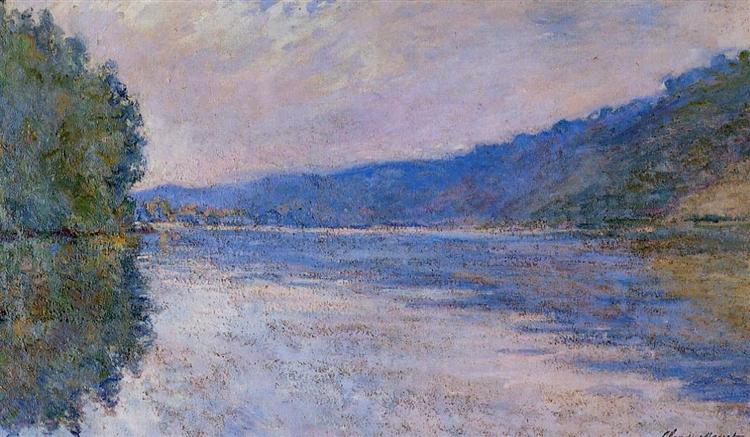Description
Claude Monet's "The Seine at Port-Villez", painted in 1894, is a magnificent example of the Impressionist style that characterized the artist's career. Monet, one of the founders of Impressionism, often focused on capturing the variations of light and color that flavored natural landscapes, and this work is no exception. The scene portrays the River Seine in the stillness of an afternoon, in an idyllic setting that exudes tranquility and harmony.
In the composition of "The Seine at Port-Villez", Monet uses a perspective that invites the viewer to immerse himself in the landscape. The expanse of the river unfolds from the foreground to the background, guiding the gaze towards the horizon. This technique not only determines a sense of depth, but also establishes an emotional connection with the space depicted. The gentle ripples of the water are reflected in the changing light of the sky, which adds an almost magical dimension to the work. Monet manages, through quick and loose brushstrokes, to capture the essence of movement in the water, as well as the effects of light on its surface.
Monet's chosen colour palette is particularly notable. Blues and greens dominate the scene, but Monet also incorporates warm shades of yellow and orange that contrast with the cool colours, creating a vibrant chromatic harmony. This concern with colour and its use to evoke atmosphere is essential to Monet's work, and here it manifests itself in the way colours are interspersed and fused together, reflecting his interest in natural light and the specific time of day.
It is interesting to note the presence of the human figure, although the characters are limited and almost blend into the natural scene. Small boats can be seen on the river, suggesting human activity without detracting from the landscape. Monet was known for his desire to convey the liveliness of nature in his works, and although humanity may be present, it never interferes with the serenity of the natural environment.
The context of this painting is particularly relevant. Monet produced this work during his stay in the Normandy region, where he often painted the landscapes that surrounded him. Port-Villez, a small town on the banks of the Seine, offered him the perfect setting to explore his ideas about color and light. In a period when Monet was seeking to hone his technique, "The Seine at Port-Villez" represents a remarkable advance in his ability to capture the ephemeral essence of nature.
Monet's relationship with water is a recurring theme in his work. His series of paintings depicting light and water, such as "The Water Lilies" and "Impression, Sunrise," show his dedication to exploring how water reflects its surroundings. In this work, as in others, Monet does not simply depict a landscape; he creates a poetic interpretation of it, where light, color, and form converge to offer a visual experience that transports the viewer in time and space.
The Seine at Port-Villez from 1894 is a testament to Monet’s mastery of the Impressionist technique and his ability to evoke atmosphere and moment. Through his dynamic brushstrokes and focus on light, Monet invites us to contemplate the beauty of a fleeting moment, captured with a mastery that continues to resonate in contemporary art. The work is not only a visual representation, but also an exploration of perception and nature itself, making it a milestone in the evolution of landscape painting in Western painting.
KUADROS ©, a famous painting on your wall.
Hand-made oil painting reproductions, with the quality of professional artists and the distinctive seal of KUADROS ©.
Painting reproduction service with satisfaction guarantee. If you are not completely satisfied with the replica of your painting, we will refund 100% of your money.

